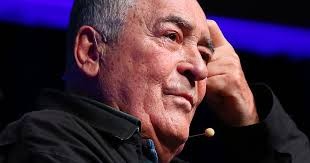
Why Bernardo Bertolucci was a great Italian filmmaker

Bernardo Bertolucci who died a few days back was a great Italian filmmaker and formed a quartet with other three greats, Vittorio De Sica, Federico Fellini and Michelangelo Antonioni.
All these great filmmakers’ real contribution lay in exploring the cinematic possibilities of the medium. Many other acclaimed filmmakers have used cinema as a means of telling a story or depicting a character or even applauding some great historical moment but few have delved deep into the medium to be ruled by its compulsions to explore the human condition. In a way, it was also a reflection of how the medium usually dictates what we see and understand; it would be a great fallacy to consider it benign or neutral. It defines the template against which the important issues are framed or human traits identified. It is this exploration with the medium that made these Italian filmmakers great.
One of the greatest characteristics of cinema has been its visual opulence, the sheer delight involved in making moving, larger-than-life images and then its paradoxical reversal -- of coping with life with all its mundane issues and contradictions. Many names or labels have been pasted on the works of these directors. Some were said to be flag bearers of the Italian Neo Realism while the others cast the French New Wave in their own idiom.
The Last Emperor made Bertolucci pick the highest number of awards but Last Tango In Paris made him famous or even notorious all over the world. As with the medium, so with issues or values like morals and loyalty, he ventured forth into depicting characters that were going through a breakdown and facing the reality of the situation nullifying all the great hype about the superstructure of values and being ‘normal’ and ‘good’. The intensity of an individual collided violently with the tameness of societal acceptance.
The same theme ran through The Dreamers, the characters who were on the cusp of making a revolution or participating in one. What was important for them at that stage of their lives established a parallel existence and hence a sub plot: they became a conduit for exploring their relationships, the compelling inevitability of sexual expression, thus placing the subjective against the objective. They seem to operate at two levels mostly failing to even come close to one another. This contradiction is what heightens the elements of disaster in them and shapes the world they live in.
Like most of his generation, Bertolucci was deeply influenced by Marxism and his earlier work reflected a more conventional reading of it in the form of movements that were led with the honest intention of fulfilling the needs of everyone including the working class. His Before the Revolution and then the epic 1900 represented that phase but also gave glimpses of what was to come.
One way of doing it was through images, especially, those that underpin the poetic structure. Bertolucci himself wanted to be a poet and he did make a promising beginning but was sucked into the poetic film genre with his exposure to Pasolini. It was also a merger between the poetic idiom and that of the visual one in cinema.
In this, the two were treading on the same ground as indeed Tarkovsky. The latter’s narrative too was built or established through a series of images -- drawn from poetry, albeit with a heavy hue of visual splashed all across it. Bertolucci’s work set itself open to many layers; he stayed away from conventional understanding of Marxism for it was located in the physical surrounding of Italy and imbued in the details of his growing up years. It was very personal and it spoke across to a larger audience that cinema is supposed to attract.
He was accused of not having properly briefed the actor that there would be explicit scenes including one of rough sex and Maria Schneider, the leading lady, later complained and said it made her suffer permanent damage. But it was one way for Bertolucci to capture the most authentic expression. In this, he seemed to a follower of Hitchcock who also was accused of filming scenes that were not fully explained to the actors and the unexpectedness of it made him get an authentic output. In today’s world all these would be considered breaches of some kind but in the past, getting the best result justified an act or word. No wonder, he was honoured with some of the best cinematographic awards.